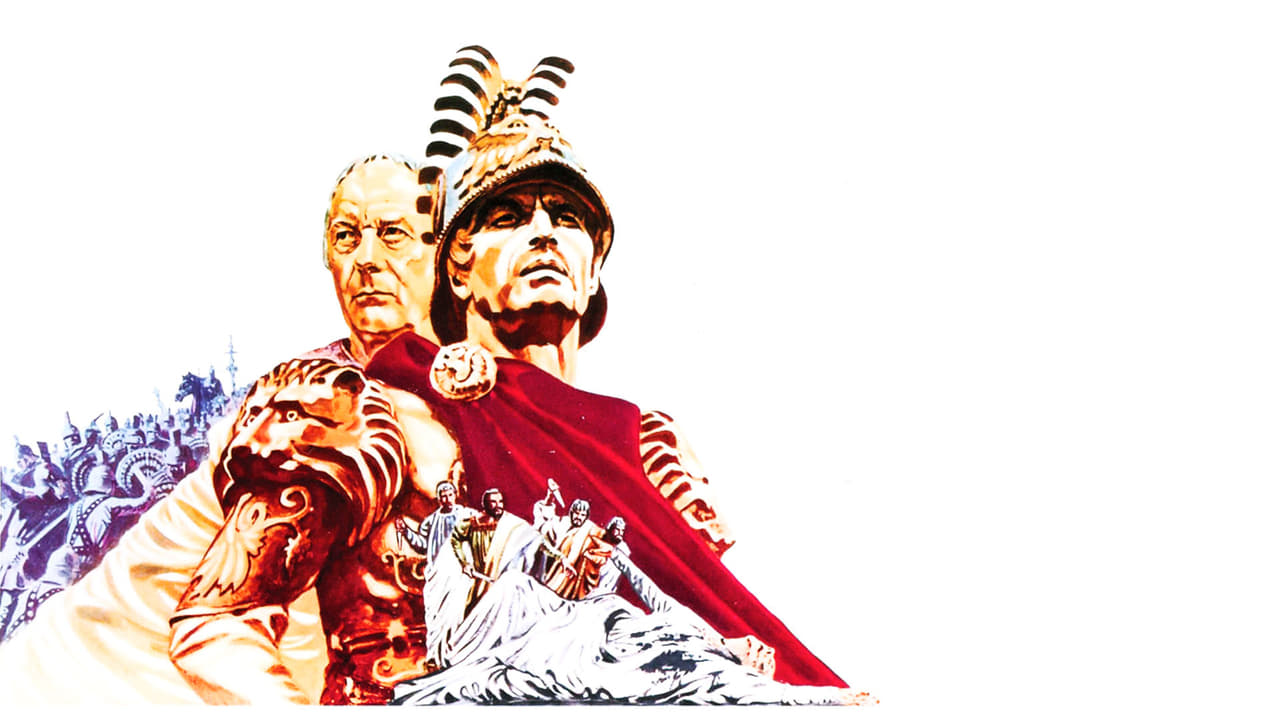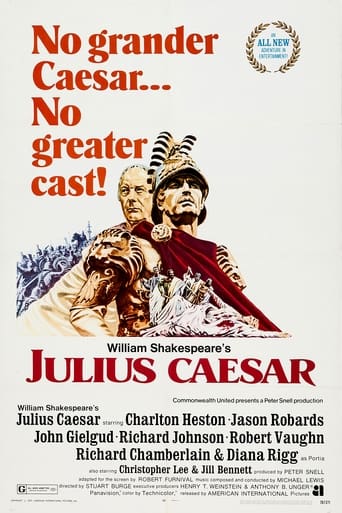

Watching a period film means watching an age unfold in front of your eyes; it's something that brings back the past alive, either in an entertaining or offbeat manner. JULIUS CAESAR, which was shown to me and my classmates in school by our history teacher, turned out to be nothing but just a heavily boring and stage-dramatic period drama which has only its performances as the plus points.Drama doesn't necessarily mean it has to be boring. It can be entertaining as well. JC delivers on the performance front, but fails to serve its purpose in any possible way. Technically too, the film is just average, and with fairly decent yet average battle scenes, the film doesn't hold its ground. Efforts by the actors and makers are appreciable, but as a whole, the film's quite unimpressive.Honestly, the film started well but as it proceeded, it turned out to be a completely disappointing affair which felt too long and overdone at 117 minutes.
... View MoreHaving gotten pretty far into Shakespeare Month, I think this is probably the weakest film I've seen so far. And the thing is, when you have someone as beloved as Shakespeare, it's really hard to even go bad with him, except that Hamlet version shown on "Mystery Science Theater 3000". I was quite impressed by the color. 1970 was the year that nearly every movie was in color and it shows. There's one major complaint I have. Why is it that the actors portraying Julius Caesar and Brutus look so similar? I thought that was a weird casting choice.Well, that's minor, but the thing is, this movie doesn't give you anything that unique. I guess the pacing is nice, but the battle scenes aren't that good. In a few ways, it actually does improve over the 1953 version because the actual assassination of Caesar is depicted well. I feel bad for not recognizing Charlton Heston. The length was pretty good, but there's just nothing to really recommend it over any other Shakespeare movie. The acting could be better, but it's just fine overall. **1/2
... View MoreI've seen plenty bum Shakespeare, but Jason Robards as Brutus he takes me the cake. He resembled nothing so much as a barrel with a head on top. The rest of the cast was pretty good, however, especially Richard Johnson as Cassius (why wasn't HE Brutus), Diana Rigg as Portia and Charlton Heston as Antony. John Gielgud as Caesar does his lines beautifully, as always, but does not quite convey the menace and power of Caesar. (He was better as Cassius in the 1953 version.) Interesting here is the contrast in line delivery between Johnson and Robards; it makes you wonder why Cassius isn't the leader and hope of the conspiracy. Production values are sometimes dubious; but battle scenes are better than the cowboys-and-Indians fight in the 1953 version. Of course, the text is shortened, but all essential scenes are kept.
... View MoreBy now in his late forties and sporting an obvious, bright red hairpiece, Charlton Heston seemed an odd Antony when first seen. But Heston remained fit all through his long career. While he does not as much look the part, his Marc Antony provides a sturdy center for this second filming of the Shakespeare tragedy. Also, Charlton Heston had a scholarly side unusual for a Hollywood actor. He clearly gave much thought to this portrayal which on the whole is better than the misplaced Method emoting of Marlon Brando's Antony, some seventeen years earlier. Featuring a mixed cast of British and American actors, the result is mainly predictable but some surprises and disappointments also feature. One disappointment is Gielgud as Caesar. Sir John was a veteran Shakespearian by 1970 with a fine voice and tons of dignity. Yet at sixty-six he was a touch too old for the part. More to the point, the effete Gielgud lacked the masculine force to play this virile ex-general whose battlefield victories were said to be matched only by his conquests in the bedroom. One surprise is the subtle portrayal of the conspirator Casca by American Robert Vaughan. "Sour" Casca, the cynical observer, is a minor character but sharply drawn and Vaughan makes him come alive during his few minutes on stage. Jill Bennet is sympathetic as the prophetic wife of Caesar but in the role of Brutus' wife the well-born Portia, Diana Rigg at age thirty-two looks luscious and is simply superb--Shakespeare in the finest style. Another veteran Shakespearian, Richard Johnson, is nearly as good as the jealous, manipulative Cassius.Jason Robards plays Brutus like a wooden Indian for the first two acts. In the third act however--that is, after Brutus and Cassius have fled Rome--he seems to grow in the part and his acting gains conviction. The importance of the plebeians to the play was understood by this director, who cast the roles carefully.
... View More